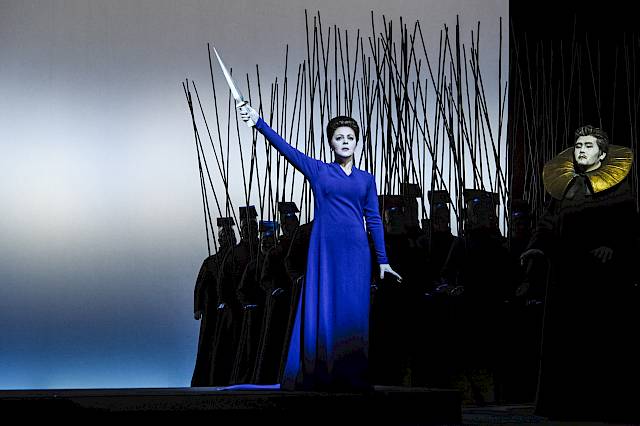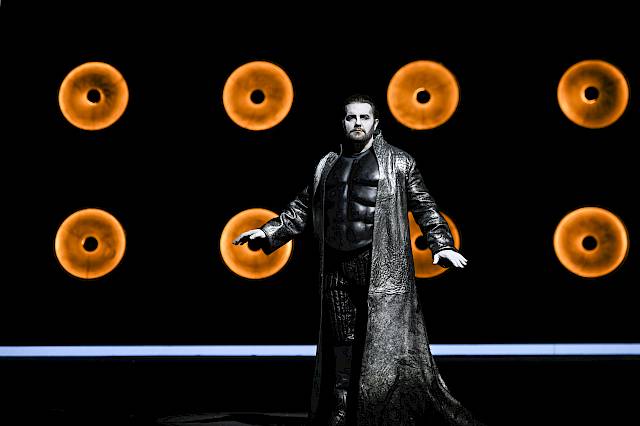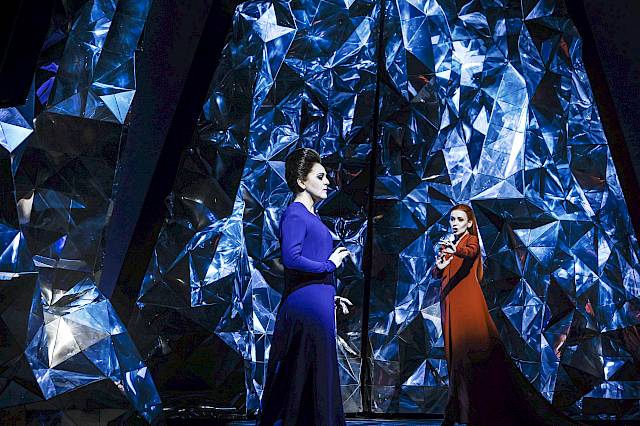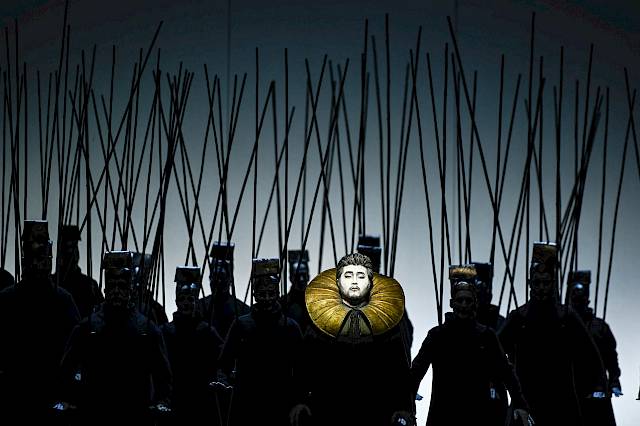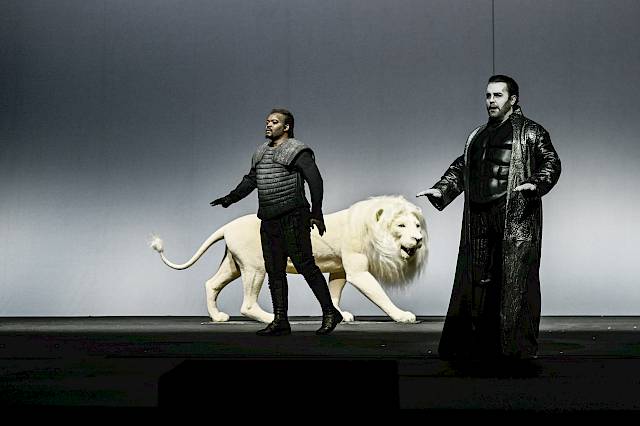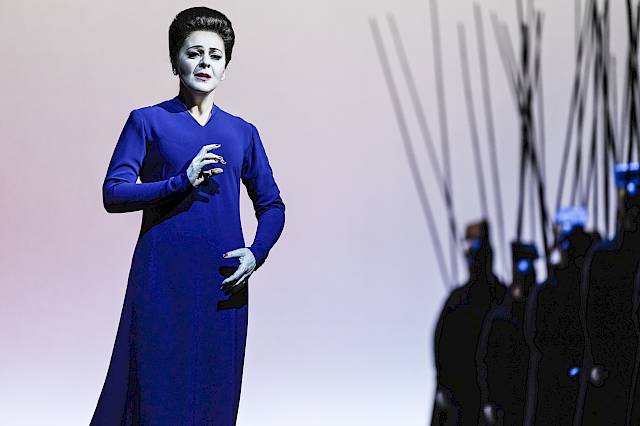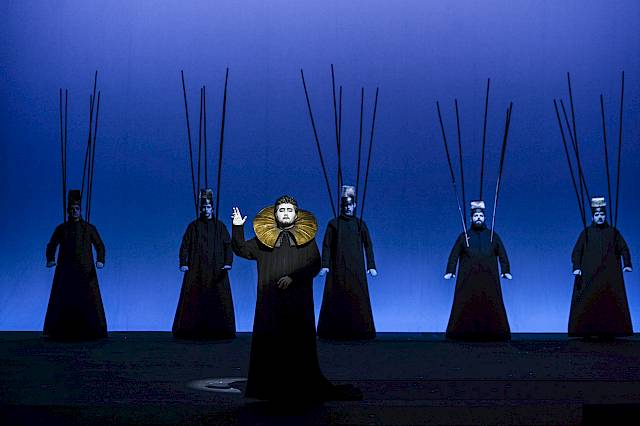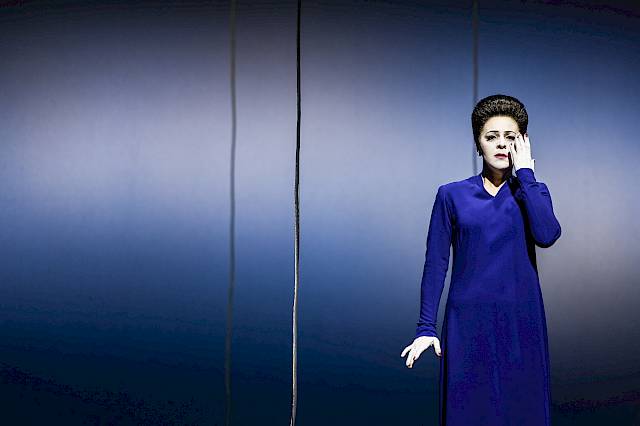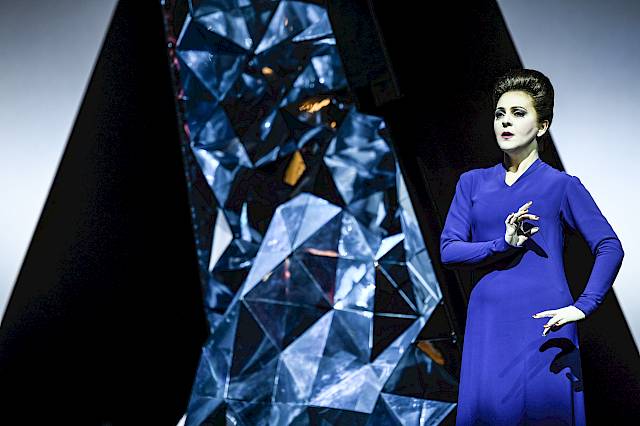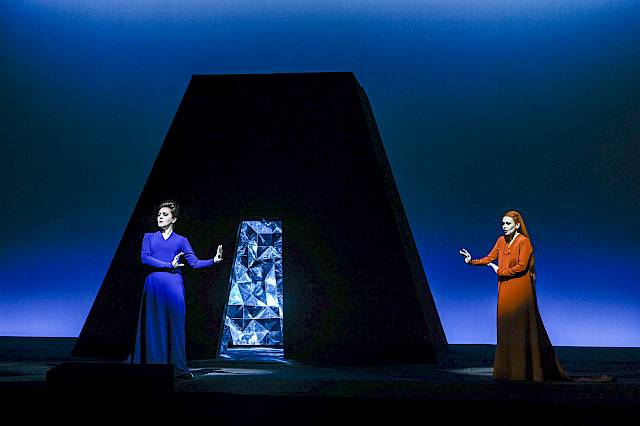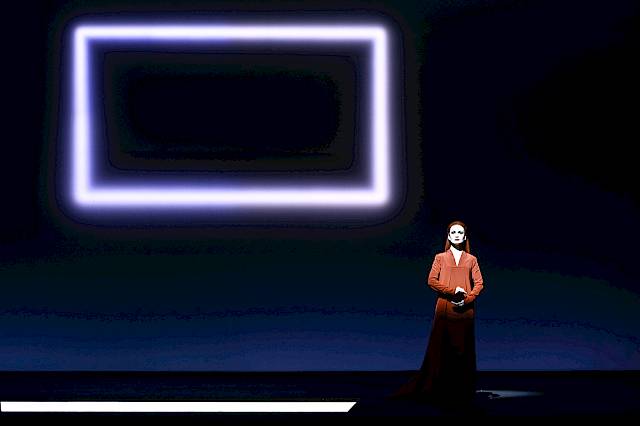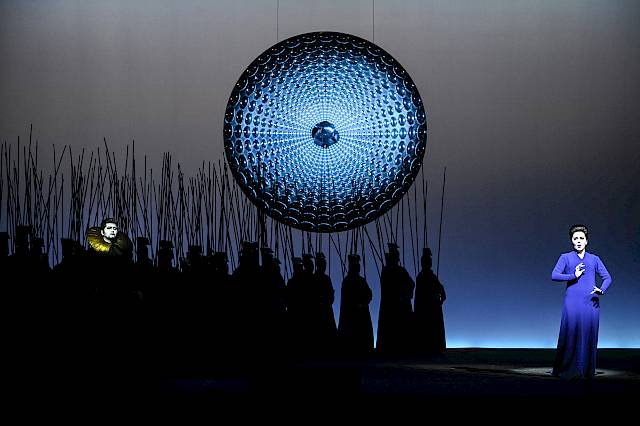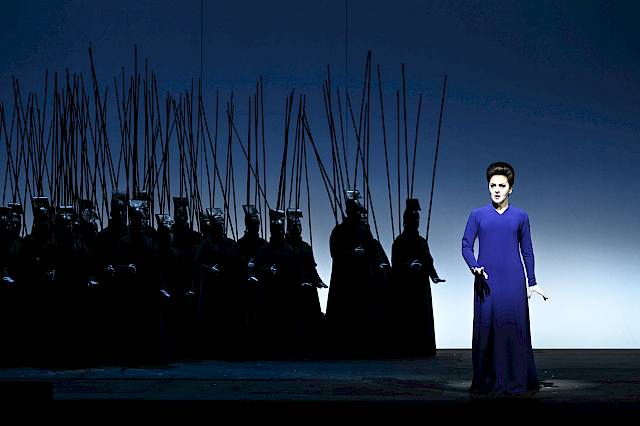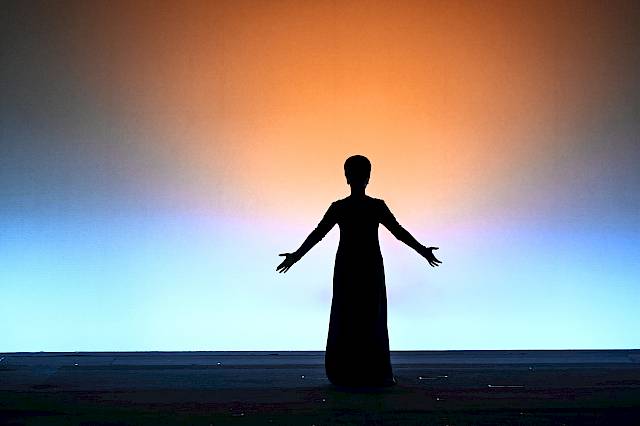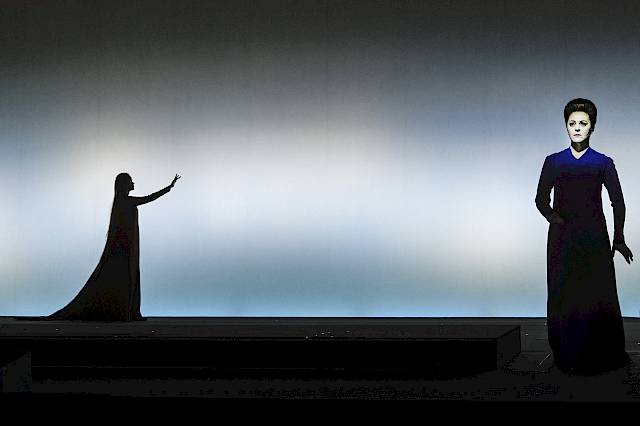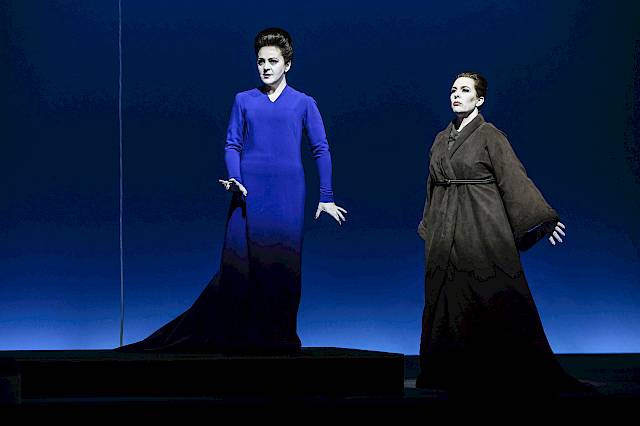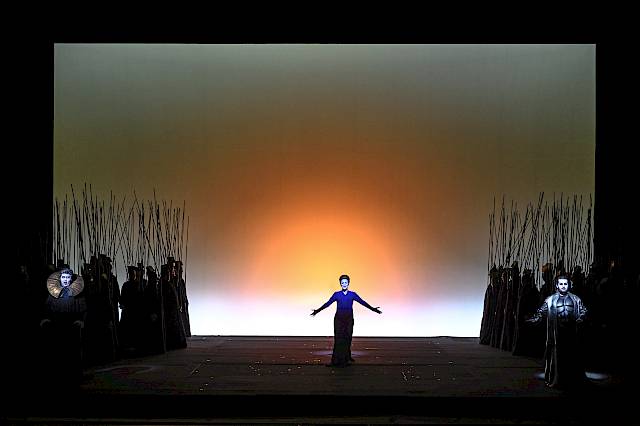Norma
Tragedia lirica in two acts by Vincenzo Bellini (1801-1835)
Libretto by Felice Romani
after the tragedy «Norma ou L’Infanticide» by Alexandre Soumet
In Italian with German and English surtitles. Duration 3 H. 05 Min. incl. intermission after 1st act after approx. 1 H. 25 Min. Introduction 45 min before the performance.
Past performances
January 2015
31
Jan19.00
Norma
Opera by Vincenzo Bellini, Saturday subscription
February 2015
03
Feb19.00
Norma
Opera by Vincenzo Bellini, Tuesday subscription B
06
Feb19.00
Norma
Opera by Vincenzo Bellini, Belcanto subscription
08
Feb20.00
Norma
Opera by Vincenzo Bellini, Sunday subscription D, Italian opera subscription
12
Feb19.00
Norma
Opera by Vincenzo Bellini, Thursday subscription A
15
Feb20.00
Norma
Opera by Vincenzo Bellini
21
Feb19.00
Norma
Opera by Vincenzo Bellini, Mixed subscription A
Good to know
Norma
Synopsis
Norma
Act One
Oroveso, the Chief Druid and Norma’s father, asks the Gallic warriors to beat the gong as soon as the moon rises. This is the signal for his daughter to perform the rite in the sacred grove, where she can also fathom the will of Irminsul, god of war. The men want Norma at last to give the signal to rebel against the occupying Roman forces.
The Roman proconsul Pollione, Norma’s secret husband and father of her two children, reveals to his friend Flavio that he has fallen in love with another, younger priestess, Adalgisa. He tells Flavio about a vision he had of Norma’s revenge taking him by surprise at his wedding to Adalgisa in Rome. – The druids’ sacred gong resounds, and Norma is called into the grove. Flavio warns of the mortal danger threatening any unbeliever who is found in the forest. Pollione affirms that he will vanquish the gods of the Gauls for the sake of his love for Adalgisa.
The Gauls gather in order to hear the god Irminsul’s orders from the mouth of their seer, Norma. She opposes their calls for war, as the enemy is in a stronger position, and prophesies that Rome will one day perish, a victim of its own vice. She then invokes the goddess of the moon, asking her to lend weight to her appeals for peace. The people join in her prayer. Norma still intends to protect Pollione, but has not failed to notice that his love for her has diminished.
At the altar after all have left, Adalgisa implores Irminsul to help her resist the temptation to which she is subjected by an unknown Roman, whom she has been meeting secretly in the forest for some time. Pollione appears and urges her to go to Rome with him as his wife. She can no longer suppress her feelings and promises to break her priestess’s vows and flee with him the next morning.
In Norma’s house, her confidante Clotilde is looking after her two children. Norma has felt ambivalent towards them since finding out that Pollione has been recalled to Rome; until now he has not revealed to her whether he intends to take her with him. – Clotilde hides the children from Adalgisa, who has come to talk to Norma in confidence. The novice confesses that she has fallen in love and asks Norma either to release her from her vows or to help her to overcome her forbidden love. Adalgisa’s account reminds Norma of her own encounter with Pollione. She promises Adalgisa that she will be happy with her lover.
Just as Norma asks the lover’s name, Pollione appears. When Adalgisa learns that he is not only Norma’s husband, but has also had children with her, she turns away from him in horror. While Norma curses him, Pollione insists that his love for Adalgisa is stronger than anything else. The singing of the Gauls, far off, calling the priestess to return to the altar of Irminsul, mingles with Norma’s oaths of vengeance.
Act Two
Norma approaches her two sleeping children with a dagger. Without Pollione’s help she can no longer protect them from her own people; on the other hand, she does not want to allow them to become the slaves of a stepmother in Rome. However, she cannot bring herself to kill her children. She orders Clotilde to call Adalgisa. Norma announces to her that she intends to atone for her own misdeeds by committing suicide and to entrust the children to her rival. Yet Adalgisa will hear nothing of a union with Pollione. Instead, she suggests going to the Roman camp in order to persuade him to return to Norma. The two women swear eternal friendship.
The warriors meet in the forest in secret to discuss how they should act in the knowledge that Pollione has been recalled to Rome. Oroveso joins them and reports that Pollione is to be succeeded by an even crueller military leader. However, as long as Irminsul does not give his consent, through Norma, to their launching an attack, the men are condemned to silence. They decide to pretend to be peaceable in order to strike even more effectively when the time comes.
Just as Norma is indulging in new hopes, Clotilde brings her a message from Adalgisa: Pollione has no intention of returning to her. Far from it – he swears to abduct Adalgisa from the altar. Now Norma’s fury knows no bounds. She beats the sacred gong and demands that the people who come running intone the chants of war. Clotilde reports that a Roman has been captured in the sacred grove; it is Pollione. He refuses to answer Oroveso’s questions, instead asking to be put to death. Norma steps forward and takes the sacrificial knife. However, she changes her mind and sends everyone away – explaining that she must first discover with whom the evil-doer is in league.
One last time, Norma beseeches her faithless husband to forsake Adalgisa; under this condition she will save his life and then part from him for ever. When he refuses, she tells him how she has already been on the point of killing their two children. Now Pollione’s death is no longer enough for her: all Romans shall pay for his disloyalty with their lives – and so shall Adalgisa, whose forbidden love she will report to the Gauls.
Norma announces to the people assembled that a new victim for Irminsul’s blood lust has been found: a priestess who has betrayed her vows and colluded with the enemy. However, she does not mention Adalgisa’s name, but accuses herself of the crime. Oroveso is as horrified as all the others present. Pollione now once again acknowledges Norma and asks her for forgiveness. He wants to die with her, united in love. Norma forces her father to promise to adopt her children – conceived against the divine law. Now she is ready to mount the pyre.
Biographies
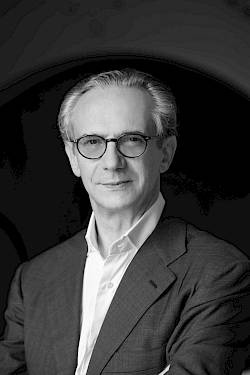
Fabio Luisi,
Fabio Luisi
Fabio Luisi hails from Genoa. He is the general music director of the Opernhaus Zürich, the principal conductor of the Danish National Symphony Orchestra, music director of the Maggio Musicale Fiorentino, and music director designate of the Dallas Symphony Orchestra, a post he will take up in 2020. From 2011-2017, Fabio Luisi was principal conductor of the Metropolitan Opera in New York, and from 2005-2013 principal conductor of the Wiener Symphoniker, as well as general music director of the Staatskapelle Dresden and the Sächsische Staatsoper (2007-2010), artistic director and principal conductor of the MDR Sinfonieorchester Leipzig (1999-2007), and music director of the Orchestre de la Suisse Romande (1997-2002). With the latter, he made numerous CD recordings (Poulenc, Respighi, Mahler, Liszt, a recording of the complete symphonic works of Arthur Honegger, and Verdi’s Jérusalem und Alzira). He is music director of the Festival della Valle d’Itria in Martina Franca (Apulia) and has appeared as guest conductor with numerous renowned ensembles, including the Philadelphia Orchestra, The Cleveland Orchestra, the NHK Tokio, the Münchener Philharmoniker, the Filarmonica della Scala, the London Symphony Orchestra, the Concertgebouw Orkest Amsterdam, and the Saito Kinen Orchestra, as well as with various prominent opera orchestras. He appeared at the Salzburg Festival with performances of Richard Strauss’ Die Liebe der Danae und Die Ägyptische Helena. His most important appearances at the Opernhaus Zürich include, among others, the new productions of three Bellini operas, as well as Rigoletto, Fidelio, Wozzeck and Verdi’s Messa da Requiem. Important CD recordings include Verdi’s Aroldo, Bellini’s I puritani and I Capuleti e i Montecchi, and the complete symphonies of Robert Schumann, as well as the symphonies and the oratorio Das Buch mit sieben Siegeln by Franz Schmidt, the largely forgotten Austrian composer. In addition, he has recorded various symphonic poems by Richard Strauss, and a lauded reading of Bruckner’s Symphony No. 3 with the Staatskapelle Dresden. His recordings of Siegfried and Götterdämmerung with the Metropolitan Opera Orchestra won Grammy awards. He received the Premio Franco Abbiati, the coveted Italian critics’ prize, in 2013, and in 2014 won the Grifo d’Oro from the city of Genoa. He was awarded the Anton Bruckner Ring by the Wiener Symphoniker, and is a Cavalier of the Italian Republic. The «Philharmonia Records» recording label, founded by the Philharmonia Zürich in 2015, has issued CD recordings of works by Berlioz, Wagner, Verdi, Rachmaninoff, Bruckner, Rimsky-Korsakov, and Frank Martin under Fabio Luisi’s musical director, as well as DVD records of Rigoletto (stage direction: Tatjana Gürbaca), Wozzeck (stage direction: Andreas Homoki), I Capuleti e i Montecchi (stage direction: Christof Loy), the Messa da Requiem (stage direction /choreography: Christian Spuck), and Das Land des Lächelns (stage direction: Andreas Homoki).
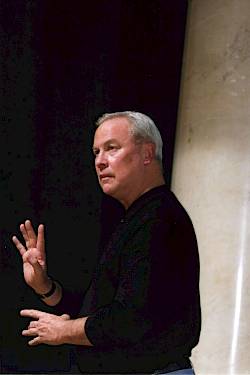
Robert Wilson,
Robert Wilson
Robert Wilson wurde 1941 in Waco/Texas geboren. Nach dem Architekturstudium erregte er in den 60er Jahren Aufsehen mit ersten experimentellen Aufführungen: Baby Blood (1967), Life and Times of Sigmund Freud (1969) und Deafman Glance, einer fünfstündigen stillen Oper. Gemeinsam mit Philip Glass entstand die Oper Einstein on the Beach. Ende der 70er Jahre arbeitete Wilson erstmalig an Theatern in Deutschland: An der Berliner Schaubühne entstand Death, Destruction and Detroit (1979,1987), an den Münchner Kammerspielen Die goldenen Fenster (1982). Zwei Jahre später traf Wilson auf Heiner Müller, der am deutschsprachigen Teil von CIVILwarS mitarbeitete, einem Stück, das in fünf Orten weltweit entstand und bei den Olympischen Spielen in Los Angeles zusammengeführt wurde. Am Hamburger Thalia Theater entstand The Black Rider (1991). 2003 inszenierte er am Berliner Ensemble Leonce und Lena (Musik: H. Grönemeyer), 2007 Die Dreigroschenoper von Brecht/Weill und 2009 Sonette (Musik: Rufus Wainwright). In Zürich und am Châtelet in Paris inszenierte er Wagners Ring des Nibelungen, in Zürich ausserdem Lohengrin, an der Scala und der Pariser Oper, den Salzburger Festspielen und in Los Angeles die Opern Monteverdis. Neben fünf Einladungen zum Berliner Theatertreffen erhielt er u.a. den «Goldenen Löwen» der Biennale Venedig, den «Obie-Award» für Regie und die Nominierung zum Pulitzer-Preis für Theater. 1992 gründete Wilson das Watermill Center, eine Kultureinrichtung auf Long Island, die die Arbeit und Entwicklung von jungen Künstlern unterstützt. Zu seinen jüngeren Inszenierungen gehören u.a. Life and Death of Marina Abramovic, Faust (Berliner Ensemble), Adam’s Passion von Arvo Pärt, Edda am Norske Teatret Oslo und Pushkin’s Fairy Tales am Theater of Nations in Moskau. Geplant ist zudem u.a. Jungle Book in Zusammenarbeit mit CocoRosie in Luxembourg.
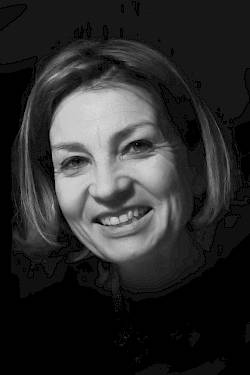
Stephanie Engeln,
Stephanie Engeln
Stephanie Engeln stammt aus Düsseldorf. Sie studierte Innenarchitektur und Design. Seit 1985 gestaltet sie nicht nur Bühnenbilder, Kostüme und Lichtdesign in Schauspiel und Oper, sondern zeichnet auch für das Design von Ausstellungen, Museumsinstallationen und Hoteleinrichtungen verantwortlich. Seit 1989 arbeitet sie eng mit Robert Wilson zusammen, u.a. an der Metropolitan Opera New York, an der Opéra de Paris, bei den den Salzburger Festspielen, am Teatro Real Madrid, beim Maggio Musicale Fio-rentino und am Bolshoi Theater in Moskau. Sie war bei Robert Wilsons berühmten Produktionen wie Madame Butterfly, Pelléas et Mélisande sowie der Ruhrtriennale Produktion The Temtations of St. Anthony als Bühnenbildnerin beteiligt. Wichtige Ausstellungen waren u.a. «Mr. Bojangles Memory» am Centre Pompidou in Paris, «Giorgio Armani Show Exhibition» am Guggenheim Museum New York und «Mozart’s Birthplace» in Salzburg.
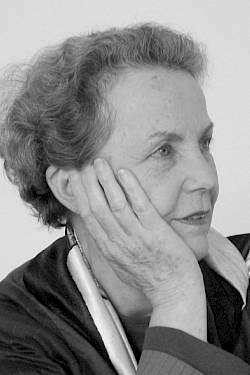
Moidele Bickel,
Moidele Bickel
Moidele Bickel wurde in München geboren. Sie begann ihre Karriere als Kostümbildnerin am Theater am Turm in Frankfurt. 1970 zog sie nach Berlin und arbeitete dort während 22 Jahren zusammen mit Peter Stein. Zunächst waren sie an der Schaubühne am Halleschen Ufer tätig und ab 1981 an der Schaubühne am Lehniner Platz. Ab Anfang der 1970er Jahre war Bickel auch immer wieder für Film- und Fernsehproduktionen tätig und arbeitete an Theatern und Festivals in ganz Europa. Sie arbeitete regelmässig mit Regisseuren wie Luc Bondy, Robert Wilson und Patrice Chéreau. Mit Luc Bondy entstand u.a. The Turn oft he Screw beim Festival d’Aix-en-Provence und Schnitzlers Anatol bei den Wiener Festwochen. Für Robert Wilson entwarf sie zahlreiche Kostüme, u.a. für Die Frau ohne Schatten an der Opéra de Paris und für das Stück The White Raven bei der Expo 98. Sie zeichnet sich zudem für das Kostümbild der Romanverfilmung von La Reine Margon (Die Bartholomäusnacht) verantwortlich und wurde dafür 1995 für den Oscar für das beste Kostüm-Design nominiert. 2009 gestaltete sie die Kostüme bei Michael Hanekes Kinofilm «Das weisse Band – Eine deutsche Kindergeschichte». Der Film erhielt zahlreiche internationale Auszeichnungen, Moidele Bickel wurde mit dem Deutschen Filmpreis ausgezeichnet. Moidele Bickel starb 2016 in Berlin.
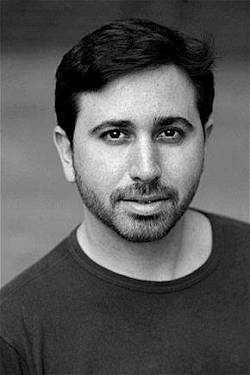
AJ Weissbard,
AJ Weissbard
Der amerikanische Lichtdesigner AJ Weissbard ist weltweit in den Bereichen Theater, Video, Ausstellungen und Architektur tätig. Zu den Künstlern, mit denen er arbeitet, gehören Robert Wilson, Peter Stein, Luca Ronconi, Daniele Abbado, Marina Abramovic, Bernard Sobel, Peter Greenaway, William Kentridge, Giorgio Armani, Hugo Boss, und die Martha Graham Dance Company. Für Oper, Schauspiel und Ballett arbeitete er u.a. am Lincoln Center New York, an der Brooklyn Academy of Music, an der Opéra Garnier und am Théâtre du Châtelet Paris, am Théâtre La Monnaie in Brüssel, am Teatro Real Madrid, an der Mailänder Scala, am Piccolo Teatro Milano, an der Schaubühne Berlin, am Esplanade Singapore und am Bunka Kaikan in Tokio. Multimedia-Projekte und Ausstellungen führten ihn ans Guggenheim Museum New York und Bilbao, an die Royal Academy London, ins Petit Palais Paris, ins Vitra Design Museum, zur Milano Triennale, in den Palazzo Reale Milano, ins Kunstindustrimuseum Kopenhagen und ins Shanghai Art Museum. Ausserdem war er an der Aichi World Expo 2005, der Biennale di Venezia, beim Salone del Mobile Milan und an der Biennale Valencia vertreten. Er wurde mit dem «IFSArts award for Lighting Design» und 2014 mit der „Goldenen Maske“ ausgezeichnet.
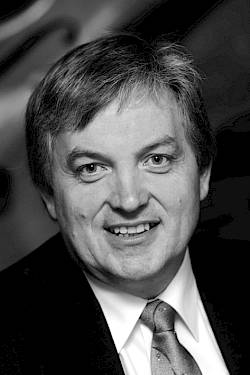
Ernst Raffelsberger,
Ernst Raffelsberger
Ernst Raffelsberger stammt aus Gmunden, Oberösterreich. Er studierte Musikpädagogik und Kirchenmusik an der Hochschule für Musik und darstellende Kunst in Wien (Chorleitung bei Prof. Erwin Ortner) und anschliessend Chordirigieren am Salzburger Mozarteum bei Prof. Walter Hagen-Groll. Von 1983 bis 1986 war er Kapellmeister der Wiener Sängerknaben. In dieser Zeit leitete er das Ensemble in Wien und auf Tourneen durch Europa, Südafrika, Kanada und die USA. Ab 1986 war Ernst Raffelsberger Chordirektor und Kapellmeister am Landestheater Salzburg (Mitwirkung bei der Salzburger Mozartwoche und den Salzburger Festspielen). 1989 wurde er von Donald Runnicles als Chordirektor und Kapellmeister an das Theater in Freiburg/Breisgau berufen. Seit Herbst 1993 ist Ernst Raffelsberger am Opernhaus Zürich als Chordirektor engagiert. Hier hat er inzwischen über 100 Premieren betreut und mit vielen namhaften Dirigenten wie Riccardo Chailly, Christoph von Dohnányi, Vladimir Fedoseyev, Sir John Eliot Gardiner, Daniele Gatti, Bernard Haitink, Nikolaus Harnoncourt, Zubin Mehta und Franz Welser-Möst zusammengearbeitet. Gastspiele mit dem Opernhaus Zürich führten ihn nach Wien, London, Paris und Tokio. Zahlreiche CD- und DVD-Aufnahmen dokumentieren diese Arbeit. Im Sommer 2012 begann zusätzlich seine Tätigkeit als Chordirektor der Salzburger Festspiele. Er ist dort für die Produktionen der Konzertvereinigung Wiener Staatsopernchor verantwortlich. In seiner ersten Festspielsaison kam es u. a. zu einer erfolgreichen Zusammenarbeit mit Riccardo Muti und Sir Simon Rattle.
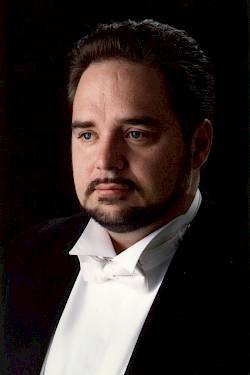
Marco Berti,
Marco Berti
Marco Berti, geboren in Como, studierte am Conservatorio Giuseppe Verdi in Mailand bei Giovanna Canetti und vervollständigte seine Ausbildung bei Adelaide Saraceni, Pier Miranda Ferraro und Gianfranca Ostini. Nachdem er den Concorso Internationale Giacomantonio gewonnen hatte, debütierte er 1990 als Pinkerton (Madama Butterfly) in Cosenza. Sein internationaler Ruf wurde durch seine Rollenporträts vor allem im Verdi-Fach gefestigt. Zu seinem Repertoire zählen u. a. Radamès (Aida), Riccardo (Un ballo in maschera), Adorno (Simon Boccanegra), Manrico (Il trovatore) sowie die Titelpartien in Ernani und Otello. Darüber hinaus gestaltet er auch immer wieder Puccini-Partien wie Calaf (Turandot), Des Grieux (Manon Lescaut), Pinkerton, Cavaradossi (Tosca), Dick Johnson (La fanciulla del West) und Edgar. Im Laufe seiner Karriere arbeitete Marco Berti mit Dirigenten wie Zubin Metha, Lorin Maazel, Riccardo Muti, Antonio Pappano, Daniel Oren, James Conlon und Nicola Luisotti sowie Regisseuren wie Franco Zeffirelli, Pier Luigi Pizzi, Liliana Cavani, Luc Bondy oder Ferzan Ozpetek. Dabei gastierte er an den grössten Häusern der Welt, darunter das Royal Opera House Covent Garden, die Metropolitan Opera New York, das Teatro alla Scala di Milano, die Arena di Verona, das Liceu in Barcelona, die Opéra national de Paris, die Staatsopern von München, Berlin, Dresden und Wien sowie die Opernhäuser von San Francisco, Chicago, Houston, Los Angeles, Peking und Tokio. In jüngster Zeit interpretierte Marco Berti Pollione (Norma) in San Francisco, Cavaradossi an der Pariser Bastille und der Berliner Staatsoper sowie Radamès in New York und Verona.
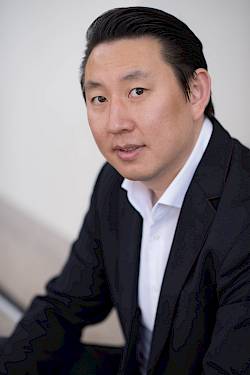
Wenwei Zhang,
Wenwei Zhang
Wenwei Zhang wurde in Dalian, China, geboren. Er war 2009/10 Mitglied im Opernstudio der Oper Frankfurt und gab als Lord Rochefort in Anna Bolena sein Debüt. 2009 sang er Orosmane (Zaira) beim Festival de Radio France in Montpellier und wurde Dritter in dem von Plácido Domingo gegründeten Gesangswettbewerb Operalia. Ab der Spielzeit 2011/ 12 war Wenwei Zhang Ensemblemitglied der Dortmunder Oper, wo er u.a. als Daland (Der fliegende Holländer), Oroveso (Norma), Warlaam (Boris Godunow), Colline (La bohème), Ferrando (Il trovatore) und Osmin (Die Entführung aus dem Serail) zu hören war. 2013 erhielt er den Theaterpreis «Bajazzo» der Theater- und Konzertfreunde Dortmund. In Zürich ist er seit der Spielzeit 2014/15 Ensemblemitglied und war hier bisher in Il barbiere di Siviglia, Die Frau ohne Schatten, Lucia di Lammermoor, Norma, Aida, Les Pêcheurs de Perles, Turandot, Macbeth, I Puritani, Der Freischütz, Lady Macbeth von Mzensk, Don Giovanni, Die Zauberflöte, Parsifal, Turandot, Luisa Miller sowie in Hippolyte et Aricie zu erleben. Im Sommer 2018 gastierte er am National Center for Performing Arts in Peking, wo er Frère Laurent (Roméo et Juliette) und Graf Rodolfo (La sonnambula) sang und im Sommer 2019 war er als Sarastro am Lincoln Center Festival in New York und an der Opéra de Marseille zu hören.
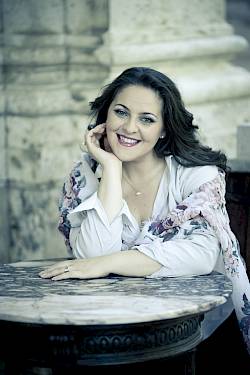
Maria Agresta,
Maria Agresta
Maria Agresta, geboren in Vallo della Lucania, studierte Gesang in Salerno und später in Modena. Ihre internationale Karriere begann 2011 am Teatro Regio in Turin mit I vespri siciliani unter der Leitung von Gianandrea Noseda. Es folgten Norma in Tel Aviv, La bohème in der Arena di Verona, München, Turin und beim Puccini-Festival in Torre del Lago, Donizettis Gemma di Vergy in Bergamo und Don Giovanni an der Mailänder Scala. Später kehrte sie mit grossem Erfolg u.a. als Mimì (La bohème) und Liù (Turandot) an die Scala zurück. Sie sang u.a. Leonora (Il trovatore) in Valencia, Madrid und Mailand, Norma in Turin, Paris, Madrid sowie Zürich, Amelia (Simon Boccanegra) in Rom und Dresden, Desdemona (Otello) in Valencia, Zürich und Genua, Elvira (I puritani) an der Opéra Bastille in Paris, Lucrezia (I due Foscari) am Londoner Royal Opera House Covent Garden, Elisabetta (Don Carlo) in Madrid und Venedig, Tosca an der Opéra National de Paris und am Teatro Real in Madrid, Adriana Lecouvreur an der Scala sowie Madama Butterfly in London und an der ABAO Bilbao Opera. 2022 gab sie als Maddalena di Coigny (Andrea Chénier) ihr Hausdebüt an der Wiener Staatsoper und debütierte im darauffolgenden Jahr als Giorgetta (Il tabarro) am Teatro dell’Opera di Roma. Konzerte führten die Sopranistin nach Graz, Dresden, Rom, Venedig, Neapel, Berlin und Valencia zu Dirigenten wie Riccardo Muti, Zubin Mehta und Nicola Luisotti. 2014 wurde sie mit dem Premio Franco Abbiati als «Beste Sopranistin» ausgezeichnet und erhielt 2021 den Premio Luigi Illica.
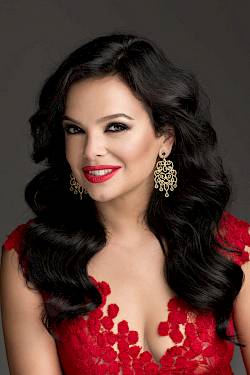
Roxana Constantinescu,
Roxana Constantinescu
Roxana Constantinescu stammt aus Rumänien. Mit dem Gewinn des ARD-Musikwettbewerbes München begann 2006 die internationale Karriere der Mezzosopranistin. Von 2007 bis 2010 gehörte sie zum Ensemble der Wiener Staatsoper wo sie Partien wie Rosina (Il barbiere di Siviglia), Zerlina (Don Giovanni), Nicklausse (Les Contes d’Hoffmann), Siébel (Faust) und Cherubino (Le nozze di Figaro) interpretierte. Seither gab sie erfolgreiche internationale Debüts, wie u.a. Despina (Così fan tutte) und Zerlina (Don Giovanni) an der Los Angeles Opera, Rosina (Il barbiere di Siviglia) an der Deutschen Oper Berlin und am New National Theatre Tokio sowie Angelina (La cenerentola) und Charlotte (Werther) an der Minnesota Opera. Ferner sang sie in den vergangenen Jahren u.a. Donna Elvira (Don Giovanni) an der Wiener Staatsoper, Dorabella (Così fan tutte) und Fatime (Oberon) am Théâtre du Capitole in Toulouse sowie Stéphano (Roméo et Juliette) an der Dallas Opera. Als Konzertsängerin tritt sie u.a. regelmässig beim Oregon Bach Festival auf. Liedrezitals führten sie in bedeutende Konzertsäle wie die Carnegie Hall, die Wigmore Hall und den Wiener Musikverein. Sie arbeitete mit Dirigenten wie Seiji Ozawa, Marco Armiliato, Kirill Petrenko, Franz Welser-Möst, Riccardo Muti, Gustavo Dudamel und Yannick Nézet-Séguin. In der Spielzeit 2014/15 sang sie Emira in Hasses Siroe an der Opéra Royale in Versailles. Mit dieser Partie wird sie auch auf einer Tournée in Brüssel, Wien, Omsk, Moskau und Amsterdam zu hören sein. Zu ihren weiteren Plänen gehören Le nozze di Figaro in Oviedo und Il barbiere di Siviglia in Peking.
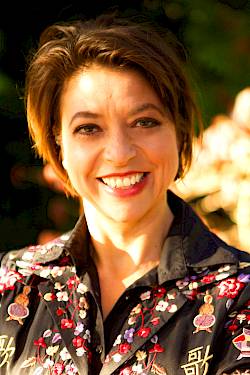
Judith Schmid,
Judith Schmid
Judith Schmid, Schweizer Mezzosopranistin, studierte Musik und Bewegung an der Hochschule der Künste Bern sowie Gesang an der Guildhall School of Music and Drama. Sie legt ihren Schwerpunkt auf die Opern- und Konzertbühne, widmet sich jedoch auch dem Lied und Oratorium. Seit über 20 Jahren ist sie u.a. am Opernhaus Zürich, wo sie langjähriges Ensemblemitglied war, oder auch am Staatstheater Nürnberg engagiert, etwa in Hosenrollen wie Smeton (Anna Bolena), Sesto (Giulio Cesare) und Silla (Palestrina) sowie als Adelaide (Arabella), Polina (Pique Dame), Federica (Luisa Miller), Maddalena (Rigoletto) Emilia (Otello), Erda (Rheingold, Siegfried), Waltraute (Walküre) sowie Erste Norn und Flosshilde (Götterdämmerung). Im Konzertbereich trat sie mit Orchestern wie dem Symphonieorchester des Bayerischen Rundfunks, dem Münchner Rundfunkorchester, dem Opern- und dem Tonhalle Orchester Zürich unter Dirigenten wie Plácido Domingo, Mariss Jansons, Daniele Gatti, Franz Welser-Möst, Nello Santi, Marc Minkowski, Adam Fischer, Marcello Viotti oder Heinz Holliger auf. Seit 2017 ist sie Dozentin für Gesang an der Hochschule Luzern, ab September 2024 mit künstlerischer Professur. Neben zahlreichen Radio- und Fernsehaufzeichnungen sowie DVD-Produktionen hat Judith Schmid auch CDs veröffentlicht. Das Album Rosenblätter mit dem Pianisten Oliver Schnyder und Werken von Grieg, Hefti und Ravel wurde 2008 vom Schweizer Radio SRF 2 Kultur zu den besten CDs gewählt. Am Opernhaus Zürich ist sie in der Spielzeit 2024/25 als Suzuki (Madama Butterfly) und als Voix de la Tombe (Les Contes d'Hoffmann) zu erleben. Ein weiteres Engagement ist in der Spielzeit 2025/26 am Luzerner Theater geplant.
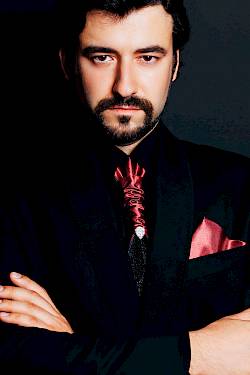
Dmitry Ivanchey,
Dmitry Ivanchey
Dmitry Ivanchey studierte Violine und Gesang an der Gnessin Akademie und am Tschaikowski-Konservatorium in Moskau. 2006 bis 2011 war er Mitglied des Moskauer Philharmonischen Orchesters. Seine professionelle Karriere als Opernsänger begann er 2008 als Mengone (Lo Speziale von Haydn). Seither sang er u.a. Graf Pierre Bezuchov (Prokofjews Krieg und Frieden) in Glasgow, Graf Almaviva (Il barbiere di Siviglia), Chevalier de la Force (Dialogues des Carmélites) sowie Lenski (Eugen Onegin) an der Helikon-Oper in Moskau, Bomelius (Die Zarenbraut) am Moskauer Bolschoi-Theater und erneut Almaviva an der Seite von Karita Mattila beim Saaremaa Opera Festival in Estland. In letzter Zeit war er zudem in Richard Strauss’ Capriccio an der Opéra National de Lyon und als Belfiore (Il viaggio a Reims) am Rossini-Festival in Pesaro zu erleben. Seit der Spielzeit 2012/13 gehört Dmitry Ivanchey zum Ensemble des Opernhauses Zürich und war hier u.a. als Junger Graf (Die Soldaten), Borsa (Rigoletto), Lord Cecil (Roberto Devereux), Almaviva (Il barbiere di Siviglia), Daniel (Robin Hood), Trin (La fanciulla del West) und Flavio (Norma) zu erleben. In dieser Spielzeit ist er als Pang (Turandot), Borsa (Rigoletto), Remendado (Carmen) und Bruno Robertson (I puritani) zu hören.


